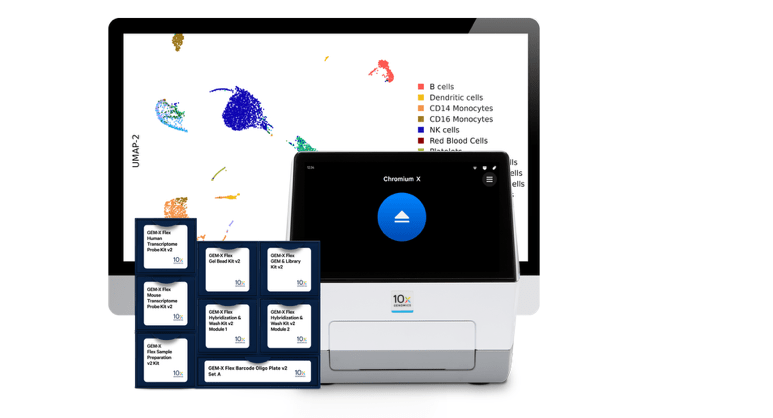New plate-based multiplexing can profile up to 384 samples and 100 million cells per week.
10x Genomics has launched the next generation of its Chromium Flex assay, featuring automation-compatible plate-based multiplexing designed to scale single-cell research applications.
The new assay can profile up to 384 samples and 100 million cells per week using a 96-well plate format that integrates with automated cell partitioning. The platform is designed to support high cell-number applications like functional genomics CRISPR screens and high-sample number applications including FFPE-based translational studies.
Built on the company’s Flex chemistry, the assay delivers sensitivity and sequencing efficiency in a scalable workflow. The automation-compatible, plate-based multiplexing supports modular usage and reduces reagent waste while extending single-cell analysis to studies that previously relied on bulk methods.
“As we increase scalability and ease of use, researchers are unlocking more—more samples, more conditions, more insights—at a fraction of the previous cost. And as AI-driven approaches evolve, the need for high-quality biological data is only accelerating,” says Michael Schnall-Levin, founding scientist and chief technology officer at 10x Genomics, in a release.
Early Access Results
Early access customers have begun using the new Flex across discovery and translational research programs.
Single-cell technologies have improved our understanding of human health and disease. However, traditional single-cell multi-omics approaches have typically profiled only thousands of cells per experiment, making it difficult to scale or capture the complex dynamics that underpin our immune response to disease,” says Peter Skene, senior director of high-resolution immunology at the Allen Institute, in a release. “The new 384-plex Flex assay from 10x Genomics is a game-changer, enabling the profiling of millions of cells at a fraction of the cost.”
The platform fixes cells for batching and ensures compatibility with liquid-handling automation, allowing researchers to explore functional immune responses with increased depth and precision.
“The next generation of the Flex assay delivers 10x’s most streamlined and robust single cell profiling to date,” says Stephen Christensen, senior principal scientist of immunology at Pfizer, in a release. “The ability to multiplex entire studies and process them in less time will be a powerful enabler for accelerating drug discovery and development.”
The new Flex is now available globally through 10x Genomics representatives.
Photo caption: Chromium Flex assay
Photo credit: 10x Genomics





